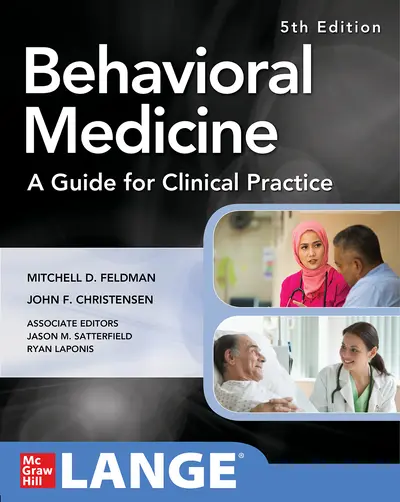My Account Details

ISBN10: 126014268X | ISBN13: 9781260142686

Step 1 . Download Adobe Digital Editions to your PC or Mac desktop/laptop.
Step 2. Register and authorize your Adobe ID (optional). To access your eBook on multiple devices, first create an Adobe ID at account.adobe.com. Then, open Adobe Digital Editions, go to the Help menu, and select "Authorize Computer" to link your Adobe ID.
Step 3. Open Your eBook. Use Adobe Digital Editions to open the file. If the eBook doesn’t open, contact customer service for assistance.
Publisher's Note: Products purchased from Third Party sellers are not guaranteed by the publisher for quality, authenticity, or access to any online entitlements included with the product. The #1 guide to behavioral issues in medicine delivering thorough, practical discussion of the full scope of the physician-patient relationship "This is an extraordinarily thorough, useful book. It manages to summarize numerous topics, many of which are not a part of a traditional medical curriculum, in concise, relevant chapters."--Doody's Review Service - 5 stars, reviewing an earlier edition The goal of Behavioral Medicine is to help practitioners and students understand the interplay between psychological, physical, social and cultural issues of patients. Within its pages readers will find real-world coverage of behavioral and interactional issues that occur between provider and patient in everyday clinical practice. Readers will learn how to deliver bad news, how to conduct an effective patient interview, how to care for patients at the end of life, how to clinically manage common mental and behavioral issues in medical patients, the principles of medical professionalism, motivating behavior change, and much more. As the leading text on the subject, this trusted classic delivers the most definitive, practical overview of the behavioral, clinical, and social contexts of the physician-patient relationship. The book is case based to reinforce learning through real-world examples, focusing on issues that commonly arise in everyday medical practice and training. One of the significant elements of Behavioral Medicine is the recognition that the wellbeing of physicians and other health professionals is critically important to caring for patients.
SECTION I: THEDOCTOR & PATIENT
Chapter 1: The Medical Interview
Chapter 2: Empathy
Chapter 3: Delivering Serious News
Chapter 4: Difficult Patients/Difficult Situations
Chapter 5: Suggestion & Hypnosis
Chapter 6: Practitioner Well-Being
Chapter 7: Mindful Practice
SECTION II: GLOBALHEALTH
Chapter 8: Global Health and Behavioral Medicine
Chapter 9: Environment, Health, and Behavior
Chapter 10: Training of International Medical Graduates
SECTION III: WORKINGWITH SPECIFIC POPULATIONS
Chapter 11: Families
Chapter 12: Children
Chapter 13: Adolescents
Chapter 14: Older Patients
Chapter 15: Cross-Cultural Communication
Chapter 16: Women
Chapter 17: Lesbian, Gay, Bisexual, Transgender, & QueerPatients
Chapter 18: Vulnerable Patients
SECTION IV: HEALTH-RELATEDBEHAVIOR
Chapter 19: Behavior Change
Chapter 20: Patient Adherence
Chapter 21: Tobacco Use
Chapter 22: Obesity
Chapter 23: Eating Disorders
Chapter 24: Unhealthy Alcohol & Other Substance Use
Chapter 25: Opioids
SECTION V: MENTAL& BEHAVIORAL DISORDERS
Chapter 26: Depression
Chapter 27: Anxiety
Chapter 28: Attention Deficit Hyperactivity Disorder
Chapter 29: Somatic Symptom & Related Disorders
Chapter 30: Personality Disorders
Chapter 31: Psychosis
Chapter 32: Sleep Disorders
Chapter 33: Sexual Problems
Chapter 34: Dementia & Delirium
SECTION VI: SPECIALTOPICS
Chapter 35: Integrative Medicine
Chapter 36: Stress & Disease
Chapter 37: HIV/AIDS
Chapter 38: Pain
Chapter 39: Errors in Medical Practice
Chapter 40: Intimate Partner Violence
Chapter 41: Trauma
Chapter 42: Palliative Care, Hospice, & Care of theDying
SECTION VII: TEACHINGAND ASSESSMENT
Chapter 43: Competency-Based Education for BehavioralMedicine
Chapter 44: Teaching Behavioral Medicine: Theory &Practice
Chapter 45: Assessing Learners & Curricula in theBehavioral & Social Sciences
Chapter 46: Evidence-Based Behavioral Practice
Chapter 47: Narrative Medicine
Chapter 48: Educating for Professionalism
Chapter 49: Trainee Well-Being
Need support? We're here to help - Get real-world support and resources every step of the way.